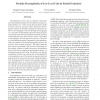Free Online Productivity Tools
i2Speak
i2Symbol
i2OCR
iTex2Img
iWeb2Print
iWeb2Shot
i2Type
iPdf2Split
iPdf2Merge
i2Bopomofo
i2Arabic
i2Style
i2Image
i2PDF
iLatex2Rtf
Sci2ools
107
click to vote
SCAM
2008
IEEE
2008
IEEE
Modular Decompilation of Low-Level Code by Partial Evaluation
Decompiling low-level code to a high-level intermediate representation facilitates the development of analyzers, model checkers, etc. which reason about properties of the low-level code (e.g., bytecode, .NET). Interpretive decompilation consists in partially evaluating an interpreter for the low-level language (written in the high-level language) w.r.t. the code to be decompiled. There have been proofs-ofconcept that interpretive decompilation is feasible, but there remain important open issues when it comes to decompile a real language: does the approach scale up? is the quality of decompiled programs comparable to that obtained by ad-hoc decompilers? do decompiled programs preserve the structure of the original programs? This paper addresses these issues by presenting, to the best of our knowledge, the first modular scheme to enable interpretive decompilation of low-level code to a high-level representation, namely, we decompile bytecode into Prolog. We introduce two notions of opt...
| Added | 01 Jun 2010 |
| Updated | 01 Jun 2010 |
| Type | Conference |
| Year | 2008 |
| Where | SCAM |
| Authors | Miguel Gómez-Zamalloa, Elvira Albert, Germán Puebla |
Comments (0)

